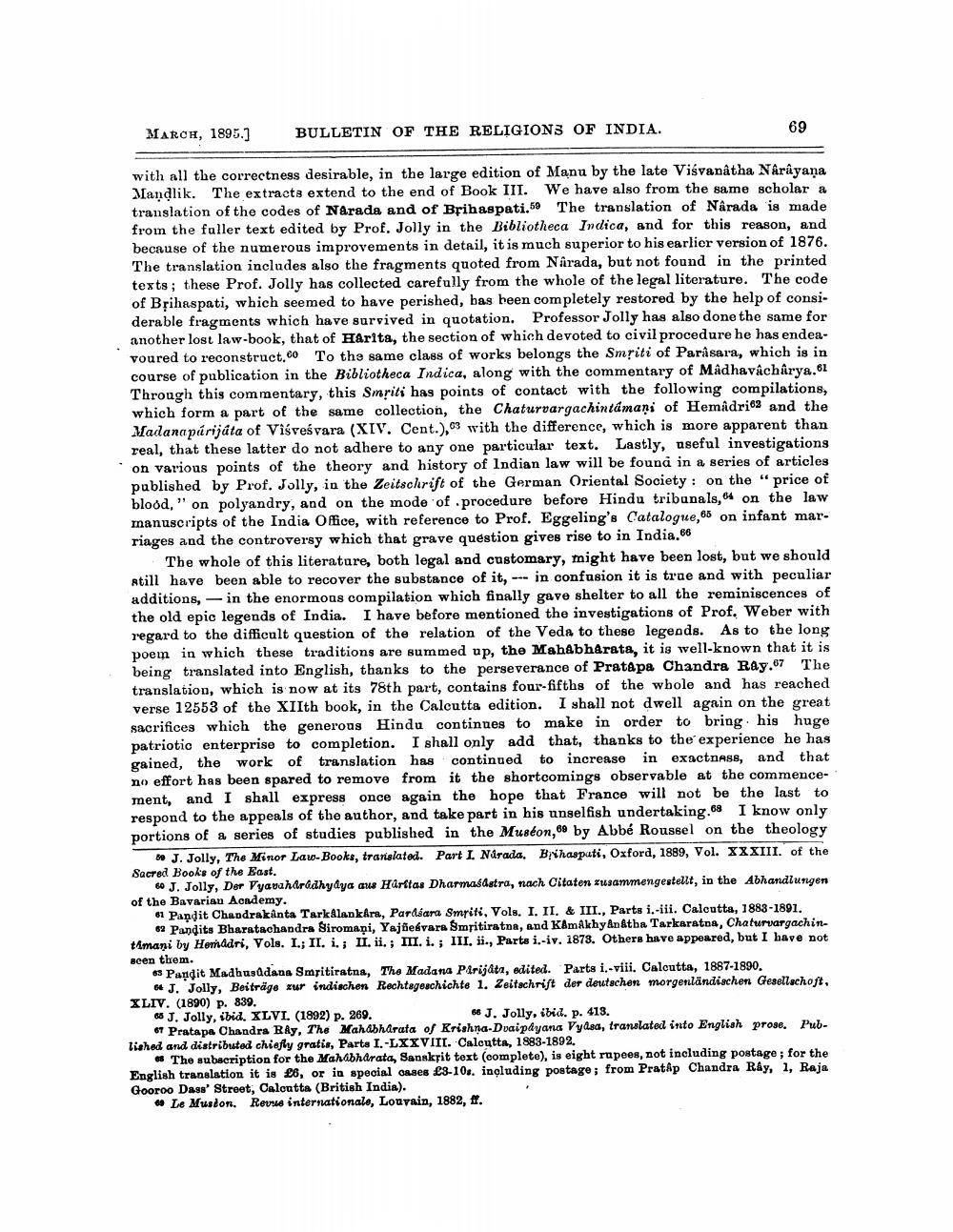________________
MARCH, 1895.)
BULLETIN OF THE RELIGIONS OF INDIA.
69
with all the correctness desirable, in the large edition of Manu by the late Visvanatha Narayana Mandlik. The extracts extend to the end of Book III. We have also from the same scholar a translation of the codes of Narada and of Brihaspati.59 The translation of Narada is made from the fuller text edited by Prof. Jolly in the Bibliotheca Indica, and for this reason, and because of the numerous improvements in detail, it is much superior to his earlier version of 1876. The translation includes also the fragments quoted from Narada, but not found in the printed texts; these Prof. Jolly has collected carefully from the whole of the legal literature. The code of Brihaspati, which seemed to have perished, bas heen completely restored by the help of considerable fragments which have survived in quotation. Professor Jolly has also done the same for another lost law-book, that of Harita, the section of which devoted to civil procedure he has endeavoured to reconstruct. To the same class of works belongs the Smriti of Parâsara, which is in course of publication in the Bibliotheca Indica, along with the commentary of Madhavacharya.62 Through this commentary, this Smriti has points of contact with the following compilations, which form a part of the same collection, the Chaturvargachintamani of Hemadri62 and the Madanapúrijáta of Visveśvara (XIV. Cent.),63 with the difference, which is more apparent than real, that these latter do not adhere to any one particular text. Lastly, useful investigations on various points of the theory and history of Indian law will be found in a series of articles published by Prof. Jolly, in the Zeitschrift of the German Oriental Society: on the “ price of blood," on polyandry, and on the mode of procedure before Hindu tribunals, on the law manuscripts of the India Office, with reference to Prof. Eggeling's Catalogue,65 on infant mar. riages and the controversy which that grave question gives rise to in India.66
The whole of this literature, both legal and customary, might have been lost, but we shonld Atill have been able to recover the substance of it, --- in confusion it is true and with peculiar additions, - in the enormous compilation which finally gave shelter to all the reminiscences of the old epic legends of India. I have before mentioned the investigations of Prof. Weber with regard to the difficult question of the relation of the Veda to these legends. As to the long poem in which these traditions are summed up, the Mahabharata, it is well-known that it is being translated into English, thanks to the perseverance of Prat&pa Chandra Ray.67 The translation, which is now at its 78th part, contains four-fifths of the whole and has reached verse 12553 of the XIIth book, in the Calcutta edition. I shall not dwell again on the great sacrifices which the generous Hindu continues to make in order to bring his huge patriotic enterprise to completion. I shall only add that, thanks to the experience he has gained, the work of translation has continued to increase in exactness, and that no effort has been spared to remove from it the shortcomings observable at the commencement, and I shall express once again the hope that France will not be the last to respond to the appeals of the author, and take part in his unselfish undertaking.68 I know only portions of a series of studies published in the Muséon, 69 by Abbé Roussel on the theology
So J. Jolly, The Minor Law-Books, translated. Part I. Nárada. Bhasputi, Oxford, 1889, Vol. XXXIII. of the Sacred Books of the East.
6 J. Jolly, Der Vyavaharadhyaya au Haritas Dharmasastra, nach Citaten fusammengestellt, in the Abhandlungen of the Bavarian Academy.
61 Pandit Chandrakanta TarkAlankara, Pardáara Smriti, Vols. I. II. & III., Parts i.-iii. Calcutta, 1883-1891.
62 Pandita Bharatachandra Siromani, Yajñeávara Smritiratna, and KAmAkhy Antha Tarkaratna, Chaturvargachintamani by Hemddri. Vols. I.; II. i. : II. ii. ; III. i. ; III. ii.. Parte i.-iv. 1873. Others have appeared, but I have not seen them.
6s Pandit Madhusudana Smritiratna, The Madana Pirijátı, edited. Parts i.-viii. Calcutta, 1887-1890.
64 J. Jolly, Beiträge zu indischen Rechtsgeschichte 1. Zeitschrift der deutscher morgerländischen Gesellschoft, XLIV. (1890) p. 839. 65 J. Jolly, ibid. XLVI. (1892) p. 269.
66 J. Jolly, ibid. p. 413. 67 Pratapa Chandra Ray, The Mahabharata of Krishna-Dvaipayana Vydsa, translated into English prose. Published and distributed chiefly gratis, Parts I.-LXXVIII. Calcutta, 1883-1892.
The subscription for the Mahabharata, Sanskrit text (complete), is eight rupees, not including postage; for the English translation it is £6, or in special cases £3-10s. including postage; from Pratap Chandra Ray, 1, Raja Gooroo Dass' Street, Caloutta (British India).
« Le Muston. Revue internationale, Louvain, 1882, ff.




